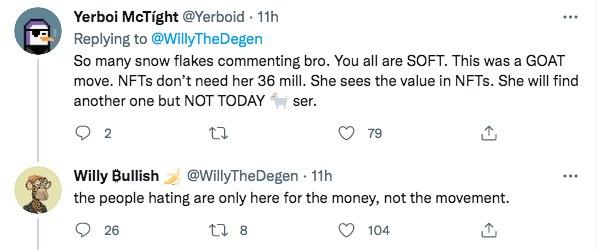
Kylie Jenner allegedly requested @WillyTheDegen to buy one of his BAYC NFTs in private, according to Twitter user @WillyTheDegen. After he allegedly blocked her to demonstrate his views surrounding the NFT culture, a debate erupted among the community.
Twitter users exchanged opposing viewpoints on the occurrence. Many people think the screenshots are phoney, but the debate over the scenario—whether hypothetical or not—showed the diversity of ideas that have spread throughout the NFT community.
Words like “culture” and “movement” are commonly used to describe the primary focus of the NFT environment, with various interpretations of what it all means. Language, technology, art, money, and value are all intertwined in an outline of what the world’s future crypto spaces should strive towards.
Others who believe the NFT movement should not be left in the hands of “the likes of Kylie Jenner” are divided, as are those who believe this was unpolite and a waste of potential for the project’s price to rise and the NFT community to flourish.
Beyond the validity of the tweet, if we see it as a hypothetical scenario in which people share their visions for how NFT should expand, the event begins to resemble a sum of the ecosystem’s values: Is it becoming elite? Is it a safeguard for decentralisation? It reminds us of creative manifestos from the past, when art was governed by the hunt for meaning.
Following Arthur Danto’s demand for “the end of art,” NFTs have established a significant milestone by providing a counterbalance to the art sector, which has hitherto been exclusive and concentrated on the wealthy.
As the blockchain becomes more widely known, people’s interest in art and technology is piqued. Without people, art is nothing, and today art reaches them regardless of colour, gender, or background.

Sofia Garcia, the creator of Artxcode, made an interesting statement regarding the NFT atmosphere on Forbes a while back:
Instead of allowing art dealers to leave artists in the dust, NFTs let everyone to see how much collectors pay for their work and let the market decide. There is a shift in who is capable of collecting high-quality works.
So, how would different members of the community react if Kylie Jenner expressed interest in an NFT?
Supporters of Willy’s Move: Protect the Value, Block Kylie Jenner

Some may recall Snapchat’s market value plummeting by $1.3 billion when Kylie Jenner announced she had deactivated the app on Twitter. The conclusion was not intended, and it exposes the influencer’s power as a foolish path that may easily infuse fragility into a growing initiative.
As a result, many people are concerned about her ability to cause prices to spike and then plummet in an unexpected circumstance. What if the phrase “came for the flicks, stayed for the art” became “came for the trend, sunk the art”?
Willy’s comment, though, appears to be focused on not enabling celebrities to achieve what they want. He sees NFTs as a “movement,” and he describes himself as someone who is more concerned with the ecosystem’s “real purpose” than with revenues.
As NFTs increase in popularity, some supporters do not want their growth to be in the hands of individuals who are just interested in it for a short time or who are simply interested in making money.
Haters of the Willy Movement, please help the market.

Many others believe that Kylie Jenner’s gatekeeping is detrimental to the BAYC initiative. Some view it as a business opportunity, but others see it as an unpolite behaviour, stating that rudeness is what genuinely harms the reputation of a developing industry, especially now that crypto is in the process of becoming more approachable.
The gesture was dubbed “clout” and a tantrum by users.
Even if we consider the event to be anything akin to a manifesto, it lacks clarity and ethics. Should celebrities be disparaged in the NFT area, which is supposed to be inclusive and unconcerned with demography, race, gender, and other factors? Should it rather be a celebration of denigration?

